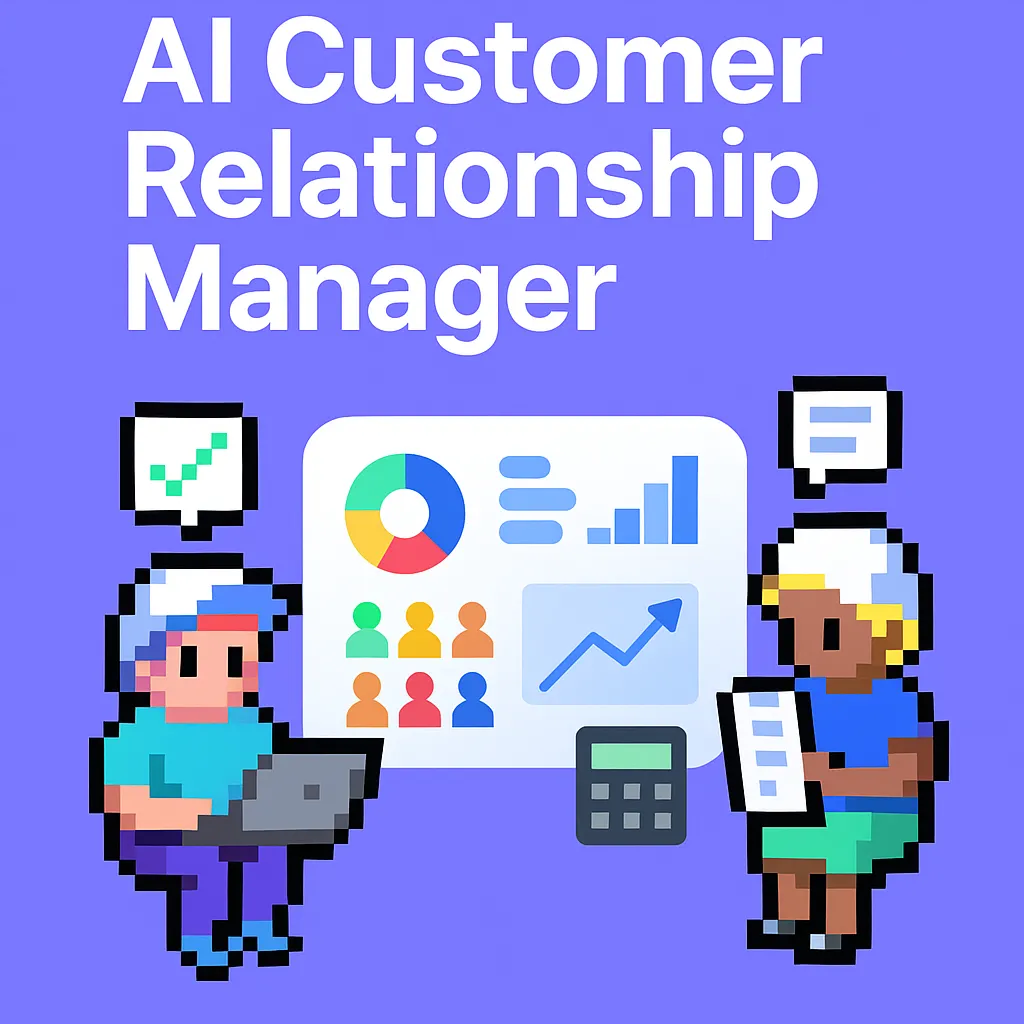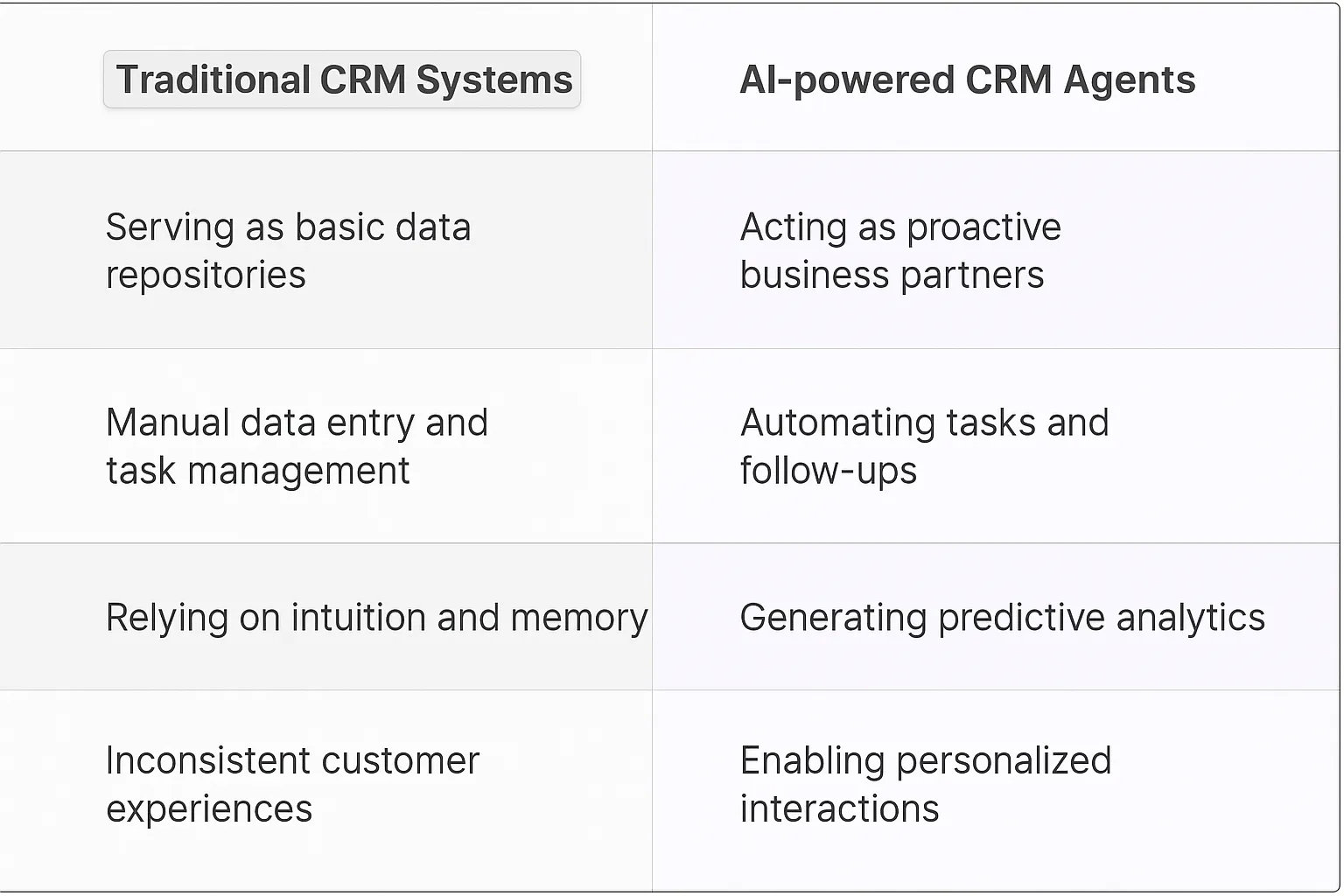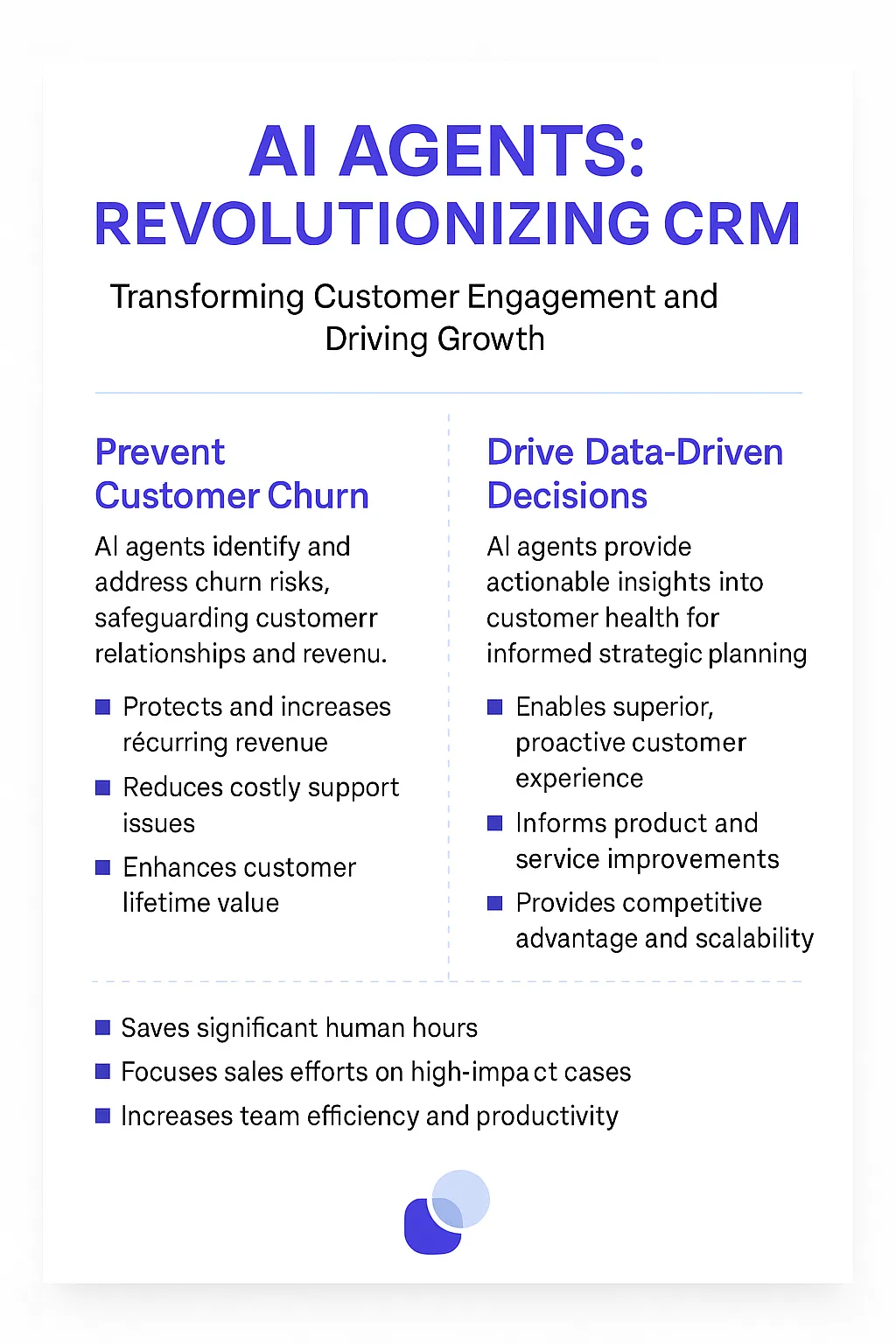A Customer Relationship Manager (CRM) is a technology for managing all your company's relationships and interactions with customers and potential customers. It's the cornerstone of modern business strategy, designed to improve business relationships, streamline processes, and increase profitability. Traditional CRMs have been digital rolodexes on steroids, storing vast amounts of customer data but often falling short in turning that data into actionable insights.
The core features of a CRM typically include contact management, lead tracking, sales pipeline visualization, and reporting capabilities. However, with the advent of AI agents, CRMs are evolving to include predictive analytics, automated task management, intelligent lead scoring, and personalized communication at scale. These AI-powered features are transforming CRMs from passive data storage systems into proactive business intelligence platforms that can anticipate customer needs, automate routine tasks, and provide deep, actionable insights.

Before AI agents entered the CRM scene, we were stuck in a world of manual data entry, endless spreadsheets, and clunky interfaces. Sales teams spent hours updating contact information, logging calls, and trying to piece together customer journeys from fragmented data. It was like trying to solve a jigsaw puzzle with half the pieces missing and your hands tied behind your back.
Traditional CRM systems were essentially glorified databases. They stored information but lacked the intelligence to provide actionable insights or automate complex tasks. Sales reps had to rely on their intuition and memory to manage relationships, often leading to missed opportunities and inconsistent customer experiences.
Enter AI agents, the game-changers of the CRM world. These digital teammates are transforming how we approach customer relationships, turning CRMs from passive data repositories into proactive business partners.
First off, AI agents are data ninjas. They can sift through mountains of customer data in seconds, identifying patterns and insights that would take humans weeks to uncover. This means sales teams can make data-driven decisions faster, targeting the right customers with the right offers at the right time.
But it's not just about data analysis. AI agents are also taking over the grunt work. They're automating routine tasks like data entry, email follow-ups, and meeting scheduling. This frees up sales reps to focus on what they do best: building relationships and closing deals. It's like having a personal assistant who never sleeps and never complains about doing the boring stuff.
Perhaps the most exciting benefit is predictive analytics. AI agents can forecast customer behavior, predict churn, and identify upsell opportunities before they're even on a human's radar. It's like giving your sales team a crystal ball, allowing them to be proactive rather than reactive in their customer interactions.
Personalization at scale is another game-changer. AI agents can tailor communications and offers to individual customers based on their preferences, behavior, and history. This level of personalization was previously impossible at scale, but now it's becoming the norm.
Finally, AI agents are learning machines. They continuously improve their performance based on new data and feedback. This means your CRM system gets smarter over time, adapting to your business's unique needs and challenges.
In essence, AI agents are turning CRMs into strategic assets that drive business growth, rather than just operational tools. They're not replacing human salespeople, but they are making them superhuman in their ability to manage and nurture customer relationships. Welcome to the future of CRM - it's AI-powered, and it's already here.

CRM systems are the backbone of modern sales and customer service operations. But let's face it, they're often clunky and time-consuming. Enter AI agents - the secret weapon that's about to transform how we handle customer relationships.
The integration of AI agents into CRM systems isn't just a nice-to-have - it's becoming a must-have for businesses looking to stay competitive. These digital teammates are transforming CRM from a static database into a dynamic, predictive powerhouse that drives real business growth.
But here's the kicker: the true power of AI in CRM lies not in replacing human interaction, but in enhancing it. By handling routine tasks and providing data-driven insights, AI agents free up sales and customer service teams to focus on what they do best - building meaningful relationships with customers.
As we move forward, the businesses that thrive will be those that successfully blend the efficiency of AI with the irreplaceable human touch. It's not about man vs. machine - it's about creating a symbiotic relationship where both can shine. Welcome to the future of CRM, where AI agents are your secret weapon in the battle for customer loyalty.

The integration of AI agents into Customer Relationship Management (CRM) systems is fundamentally altering how businesses interact with their clients. These digital teammates are not just enhancing existing processes; they're redefining the entire landscape of customer engagement. From startups to enterprise giants, companies are leveraging CRM AI agents to create more personalized, efficient, and data-driven customer experiences. Let's dive into some industry-specific scenarios that illustrate how these AI-powered tools are transforming customer relationships and driving business growth.
What's particularly exciting is how these AI agents are adapting to the unique challenges and opportunities within different sectors. They're not one-size-fits-all solutions, but rather sophisticated systems that can be tailored to address industry-specific pain points and capitalize on sector-specific opportunities. As we explore these use cases, we'll see how CRM AI agents are becoming indispensable partners in building stronger, more profitable customer relationships across various industries.
The real estate industry is ripe for disruption, and AI-powered Customer Relationship Manager (CRM) agents are poised to be the game-changers. These digital teammates aren't just glorified contact lists; they're relationship amplifiers that can transform how realtors engage with clients and close deals.
Think about the typical realtor's day: juggling multiple listings, coordinating viewings, and trying to remember every client's preferences. It's a high-touch, high-stakes dance that often leaves realtors spread thin. Enter the AI CRM agent – a tireless partner that never forgets a detail and always knows the perfect next move.
Here's where it gets interesting: These AI agents can analyze vast amounts of data to predict which properties a client is most likely to love, based on their browsing history, past purchases, and even subtle cues from their conversations. It's like having a mind-reading assistant who whispers the perfect suggestion at just the right moment.
But the real magic happens in the follow-up. AI CRM agents can craft personalized, timely communications that feel genuinely human. They'll remember that a client mentioned wanting a south-facing garden six months ago and ping the realtor when a perfect match hits the market. This level of personalization at scale was previously impossible – now it's the new standard.
The compounding effects are where realtors will see the most value. As the AI learns from each interaction, it becomes increasingly adept at nurturing leads, timing follow-ups, and even predicting market trends. This isn't just about efficiency; it's about creating a flywheel of client delight that turns into referrals and repeat business.
For the savvy realtor, this technology isn't a threat – it's a superpower. By offloading the cognitive load of relationship management to AI, realtors can focus on what they do best: being the human touch in life-changing transactions. The winners in this space will be those who embrace AI CRM agents not as tools, but as integral members of their team, amplifying their human skills to unprecedented levels.
The real estate industry is just the beginning. As these AI CRM agents evolve, we'll see them reshape industries from luxury retail to B2B sales, creating a new paradigm of hyper-personalized, always-on customer relationships. The future of CRM isn't just smart – it's prescient, proactive, and profoundly personal.
The hospitality industry is on the cusp of a major shift, and AI-powered CRM agents are the secret sauce. These digital teammates are about to flip the script on how hotels, resorts, and even cruise lines build lasting relationships with guests.
Let's break it down: hospitality is all about creating memorable experiences, right? But here's the kicker – most hotels are still stuck in the dark ages, relying on fragmented data and gut instincts to guess what their guests want. It's like trying to paint a masterpiece with your eyes closed.
AI CRM agents are the game-changer here. They're not just storing guest preferences; they're predicting desires before guests even know they have them. Imagine a system that knows a guest loves surprise upgrades, hates early check-ins, and always orders a specific type of pillow – and acts on this info without human intervention.
The real power move? These AI agents can spot patterns across thousands of guest interactions. They might notice that families who book during school breaks are 70% more likely to return if they receive a personalized activity itinerary for their kids. That's the kind of insight that turns one-time visitors into lifelong fans.
But here's where it gets really interesting: AI CRM agents in hospitality can create a network effect. As they learn from guest interactions across multiple properties or even chains, they become smarter at predicting trends and preferences. This isn't just about personalization – it's about creating a flywheel of continually improving guest experiences that compounds over time.
The smartest players in hospitality will use these AI agents to augment their staff, not replace them. Imagine a concierge armed with AI insights, able to make spot-on recommendations that feel almost telepathic. Or a marketing team that can craft hyper-targeted campaigns based on predictive modeling of guest behavior.
We're talking about a fundamental shift in how hospitality brands build loyalty. It's not just about points and perks anymore – it's about creating a digital ecosystem that knows guests better than they know themselves. The brands that nail this will create an insurmountable moat in terms of guest satisfaction and repeat business.
As these AI CRM agents evolve, we'll see them start to influence everything from room design to menu creation. They'll become the central nervous system of hospitality operations, constantly learning and adapting to create experiences that feel magical in their prescience and personalization.
The hospitality industry is just the beginning. This playbook will reshape how businesses in every sector think about customer relationships. The future of CRM isn't just about managing relationships – it's about predicting and exceeding expectations in ways that feel almost supernatural. Welcome to the era of AI-powered hospitality. It's going to be a wild ride.
Implementing a Customer Relationship Manager AI Agent isn't a walk in the park. It's more like trying to teach a robot to dance salsa while juggling flaming torches. The technical hurdles are real, and they're not for the faint of heart.
First up, data integration. Your CRM AI needs to play nice with a smorgasbord of data sources - from legacy systems that predate the internet to cutting-edge cloud platforms. It's like trying to get a group of people who speak different languages to have a coherent conversation. You need a universal translator, and in this case, it's robust APIs and data pipelines.
Then there's the AI model itself. Training a model to understand the nuances of customer interactions is like teaching a computer to read between the lines of human communication. It needs to grasp context, tone, and intent - things that even humans struggle with sometimes. You're essentially trying to create a digital empath, and that's no small feat.
Let's not forget about scalability. Your AI needs to handle everything from mom-and-pop shops to Fortune 500 giants without breaking a sweat. It's like building a car that can comfortably seat two people or two hundred, depending on the day. The architecture needs to be flexible enough to scale horizontally and vertically, adapting to the ebb and flow of customer interactions.
On the operational front, implementing a CRM AI Agent is like trying to change the tires on a moving car. You can't just hit pause on your customer relationships while you get your digital teammate up to speed.
User adoption is a beast of its own. You're asking your sales team - people who've built careers on personal relationships and gut feelings - to trust a machine. It's like convincing a master chef to let a robot sous-chef into their kitchen. You need to show them that the AI is there to enhance their skills, not replace them.
Then there's the data quality issue. Your AI is only as good as the data it's fed, and let's face it, most CRM data is about as clean as a teenager's bedroom. You need a solid data governance strategy to ensure your AI isn't making decisions based on outdated or incorrect information. It's like trying to navigate using a map where half the streets are mislabeled - you're bound to end up in the wrong place.
Privacy and security concerns are another can of worms. Your CRM AI is handling sensitive customer data, and one slip-up could land you in hot water faster than you can say "GDPR violation". You need ironclad security measures and transparent privacy policies to keep both your customers and regulators happy.
Lastly, there's the challenge of continuous improvement. The AI needs to learn and adapt based on real-world interactions, but how do you measure its performance? It's like trying to grade a student who's constantly rewriting the textbook. You need robust feedback loops and performance metrics that go beyond simple quantitative measures to capture the qualitative aspects of customer relationships.
The integration of AI agents into CRM systems marks a pivotal shift in how businesses manage customer relationships. We're moving from a world of reactive, manual CRM processes to one where AI-powered systems can predict customer needs, automate complex tasks, and provide unprecedented levels of personalization at scale. This isn't just an incremental improvement - it's a fundamental reimagining of what CRM can do.
The businesses that will thrive in this new landscape are those that embrace AI agents not as mere tools, but as integral team members that augment human capabilities. These digital teammates will free up sales and customer service professionals to focus on high-value, creative tasks that truly move the needle. As AI continues to evolve, we can expect even more sophisticated applications in CRM, from advanced natural language processing for better customer interactions to complex predictive models that can forecast market trends with uncanny accuracy.
The future of CRM is AI-powered, and it's already here. The question isn't whether to adopt these technologies, but how quickly and effectively businesses can integrate them into their operations. Those who do so successfully will find themselves with a powerful competitive advantage, able to build deeper, more meaningful customer relationships that drive long-term business success. Welcome to the age of AI-enhanced CRM - it's going to be a game-changer.